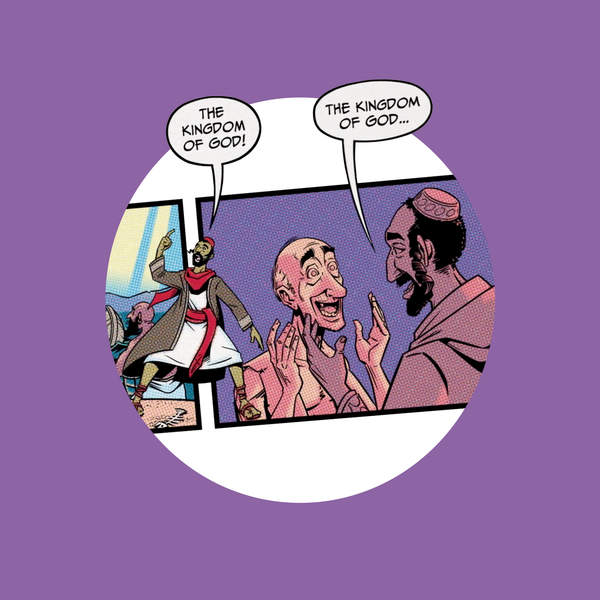
The Obvious and Extravagant Claim of the Gospel
Episode Chapters
Show Notes
Key Takeaways:
- All the gospels are essentially saying the same thing. Jesus is the Jewish Messiah and his life, death, and resurrection fulfills the Hebrew Scriptures.
- All four gospels climax with a detailed recounting of Jesus' death and resurrection. While this may seem like an obvious point to modern readers, this is not necessarily true for ancient readers when the Scriptures were formed.
- Modern readers of the gospels should make an effort to familiarize themselves with how ancient Greco-Roman biography and literature worked. The four gospels are not modern texts; therefore, readers should be sympathetic and strive to view them not through a modern lens, but in light of their historic context.
Quotes:
“The main mode that many Christians, especially Protestants, read the Bible in is the ‘lessons for my life’ approach to the Bible. The deeply held assumption is, ‘the Bible is a moral handbook and each story is giving me a life application lesson that I can apply to my life.’ And I don’t think that’s what the Gospel authors are trying to do.” "(The gospels are) tying in Jesus’ story as the fulfillment of the Hebrew Scripture storyline which is the story of Israel and all humanity. And then all of them are saying the story leads up to the moment of a Jewish wonder-worker’s execution. It’s a simple point. But that is their main point."
Shownotes
In part 1 (0-11:30), Tim and Jon briefly recap the series so far. They discuss the earlier tips for reading the gospels more effectively and deeply. Tim says readers should always remember that the gospels are meant to be stories about Jesus, but they have been specifically selected to be persuasive stories about Jesus. The Gospel authors want the reader to believe that Jesus is the Messiah. Sometimes they make this intent obvious and explicit, but other times, they make the claims indirectly. Tim says this method of indirect communication and indirect claims about Jesus is the primary way that Gospel authors design their portraits of Jesus. In part 2 (11:30-22:00), Tim notes that many of the stories about Jesus, including the stories of miracles, sound unbelievable to many modern Western audiences. Whereas in other cultures, healings and miracles and those who performed them were considered an integral part of life and evidence of God or the gods’ work. Tim shares a helpful resource called The Lost Letters of Pergamum, which is a short historical novel set in ancient Roman culture during the early days of Christianity. The novel helps readers more accurately picture what the original claims of the gospel would have meant to the first followers of Christ. Tim then says most Western Protestants read these accounts through asking, “What’s the application of this gospel story to my life and how will it improve my life?” Tim says he doesn’t think this is the best way to read the gospels. Instead, readers should learn to read the gospels as intricate and complete portraits of Jesus Christ of Nazareth that are claiming that Jesus is the promised Jewish Messiah. In part 3 (22:00-32:00), Tim notes that every Gospel climaxes with Jesus’ death and resurrection. Tim then contrasts this with the Gospel of Thomas, which does not include Jesus’ death and resurrection narrative. To the gnostics who used the Gospel of Thomas, Jesus was a wise, divine teacher who dispensed knowledge to humanity to help them learn to be wise. Tim then says that a good example of the gospels climaxing with Jesus’ death and resurrection would be the Gospel of Mark. Most of the book highlights the final week of Jesus’ life and does a fast fly-by of Jesus’ earlier life leading up to the week of the Passover and crucifixion. Most stories, Tim observes, end with the good guy defeating the bad guy, thereby using force and violence to triumph. The Jesus story claims that Jesus triumphed by allowing himself to be killed by his enemies. He then was raised from the dead and gives his enemies an opportunity to enter into new life by believing in him. In part 5 (32:00-end), Tim and Jon discuss the differences between the gospels. Tim says that some of the variances between the stories in the gospels used to bother him. Why couldn’t all the stories be the same? Aren’t the discrepancies evidence that these stories and authors might be unreliable? However, Tim continues by sharing that over time, his perspective has changed. Now, he realizes that the Gospel authors are advancing a claim about Jesus, not recounting security camera footage of his life. The authors want the reader to understand that Jesus had a totally different way of seeing the world, so they highlight this in their own style. Tim says he would actually be highly suspicious if all the gospels’ stories are exactly identical. That would imply that the Jesus story was not authentic. It also should be taken into consideration that what many modern Christians may perceive to be untruths or discrepancies in the Bible were much more accepted by early Christians. Modern readers should attempt to understand the context and culture of how the gospels were formed instead of importing our own modern view of a biography onto an ancient text.
Scripture References
Referenced Resources
- The Lost Letters of Pergamum: A Story from the New Testament World by Bruce Longenecker
- Show Produced by:
- Dan Gummel
- Powered and distributed by Simplecast
Interested in learning more? Check out Tim's library for a list of recommended books and other resources.
Get the BibleProject app for access to our entire library of resources in one place.